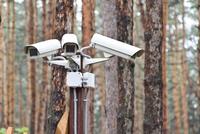-
ACLU files lawsuit challenging NSA's phone surveillance
In the wake of the past week’s revelations about the NSA’s surveillance of phone calls, the yesterday American Civil Liberties Union (ACLU) filed a lawsuit charging that the program violates Americans’ constitutional rights of free speech, association, and privacy.
-
-
Lawmakers criticize NSA leaker Edward Snowden

Lawmakers were quick to criticize Edward Snowden, the 29-year old Booz Allen Hamilton employee who disclosed the NSA surveillance program to the Guardian and the Washington Post. House Intelligence Committee chairman Mike Rogers (R-Michigan) said the national security leaks would endanger American lives. Peter King (R-New York), chairman of the Homeland Security subcommittee on Counterintelligence and Terrorism, said of the leaks: “This is a matter of extraordinary consequence to American intelligence.”
-
-
Edward Snowden, an NSA contractor employee, says he is the source of NSA leaks
Edward Snowden, a 29-year-old former technical assistant in the CIA and more recently an employee of the defense contractor Booz Allen Hamilton, has identified himself as the source of the leaks about three massive NSA surveillance schemes. Snowden says the NSA’s surveillance activities are all-consuming; these activities “are intent on making every conversation and every form of behavior in the world known to [the NSA].” He said that once he concluded that the NSA’s surveillance scheme would soon be irrevocable, it was just a matter of time before he chose to act. “What they’re doing” poses “an existential threat to democracy,” he said.
-
-
Second NSA domestic surveillance scheme revealed: data mining from nine U.S. ISPs

A day after it was revealed that the NSA was collecting communication information on millions of Verizon’s U.S. customers, another NSA domestic surveillance scheme was exposed: the NSA and the FBI have been tapping directly into the central servers of nine leading U.S. Internet service providers for the purpose of harvesting audio, video, photographs, e-mails, documents, and connection logs. The information collected allowed intelligence analysts to track an individual’s movements and contacts over time.
-
-
NSA collecting information on Verizon customers’ communications
The National Security Agency (NSA) has been collecting massive amounts of “metadata,” or transactional information, on millions of Verizon’s U.S. customers. A court granted the NSA permission to begin information collection on 25 April, stipulating the collection must end by 19 July. The court order instructs Verizon to “continue production on an ongoing daily basis thereafter for the duration of this order.” It specifies that the records to be produced include “session identifying information,” such as “originating and terminating number,” the duration of each call, telephone calling card numbers, trunk identifiers, International Mobile Subscriber Identity (IMSI) number, and “comprehensive communication routing information.”
-
-
Former CIA chief: NYPD surveillance would have prevented Boston-like attacks

Former CIA director Michael Hayden said a terror attack like the Boston Marathon bombings would never have taken place in New York City. Hayden, who also headed the National Security Agency (NSA), said the New York Police Department’s (NYPD) broad campaign of spying on the Muslim communities in the city would have helped officials identify the radical tendencies of the alleged bombers, thus preventing the attack.
-
-
Canadian company provides software to U.S. intelligence agencies
A Canadian company has spent the last few years locking up contracts to provide security software to U.S. federal agencies such as the NSA, CIA, and FBI. The company moved from the United States to Canada because the Canadian government gives tax credits for high-tech companies coming to Canada, and Canadian government agencies help the company break into new markets by sponsoring his company in international conferences. It was in one of these conferences that he once met “some NSA folks.”
-
-
Tamerlan Tsarnaev's name was on U.S. terror watchlist since 2011

In March 2011, after being contacted by the Russian security services, the CIA added the name of Tamerlan Tsarnaev to the U.S. government’s terror watchlist. DHS secretary Janet Napolitano said that Tamerlan’s travel to Dagestan, and his arrival back in the United States, were “pinged” by the department. Leading lawmakers have raised questions about whether the U.S. intelligence community and law enforcement agencies have dropped the ball on the Tsarnaev brothers.
-
-
Exploring the human brain to support national security
The other day, at a White House event, President Barack Obama unveiled a new research initiative designed to revolutionize the understanding of the human brain. DARPA plans $50 million in 2014 investments to translate this increased understanding of brain function to create new capabilities.
-
-
Pervasive surveillance threatens privacy, gives power advantage to the watcher

Surveillance is everywhere, from street corner cameras to the subject of books and movies. A researcher says that pervasive surveillance menaces our intellectual privacy and it gives the watcher a power advantage over the watched, which can be used for blackmail, persuasion, or discrimination.
-
-
FBI wants 1994 online surveillance law updated
The FBI said the agency’s top priority this year is to update a surveillance law so authorities can monitor in real time Web activities of Americans suspected of committing crimes. The 1994 law, known as the Communications Assistance for Law Enforcement Act (CALEA), applies to telecommunication companies, but only partially to Web-based companies.
-
-
In 2012, Microsoft received 70,665 law-enforcement requests for customer information
On Thursday, Microsoft released the number of law enforcement requests it has received for information on its hundreds of millions of customers. By releasing the information, Microsoft is now putting itself on the same team as Google, Twitter, Yahoo, and other Web businesses which have published reports on law-enforcement request for customer information. In 2012 Microsoft received a total of 70,665 law-enforcement requests for customer information.
-
-
WOT distorting focus, resource allocation of U.S. intelligence community: experts
The U.S. Intelligence Advisory Board, a panel of fourteen highly regarded and experienced experts, many of whom past holder of high-level national security positions, has submitted a secret report to President Obama in which they say that the intense, 12-year focus of the intelligence community on finding and fighting terrorism has distorted the priorities, resource allocation, and training within that community. Former Senator David Boren, a member of the panel, asks: “in the long run, what’s more important to America: Afghanistan or China?”
-
-
Widely used FBI surveillance method ruled unconstitutional

A national security letters (NSLs) is an administrative subpoena which allows the FBI to ask Internet companies and communication service providers to turn over subscriber information on American customers, while prohibiting the providers from informing these customers that their personal information has been turned over to the FBI. Since the 9/11 attacks, the bureau has issued an average of 50,000 NSLs a year. A federal judge in California says this is “rendering the statute impermissibly overbroad.”
-
-
Google’s assault on privacy: a reminder
A year ago, on 1 March 2012, Goggle launched its privacy-eroding policy of combining and collating users’ information across all of Goggle’s products. Google offers no opt-out option. Forcing consumers to share every aspect and nuance of their Internet practices with the company was not enough for Google. Yesterday, the attorney generals of thirty-eight states reached an agreement with Google concerning Google’s practice of spying on Wi-Fi users. The company sheepishly admitted that its Street View Vans collected 600GB of user data from unprotected Wi-Fi networks, and was fined a measly $7 million.
-
- All
- Regional
- Water
- Biometrics
- Borders/Immig
- Business
- Cybersecurity
- Detection
- Disasters
- Government
- Infrastructure
- International
- Public health
- Public Safety
- Communication interoperabillity
- Emergency services
- Emergency medical services
- Fire
- First response
- IEDs
- Law Enforcement
- Law Enforcement Technology
- Military technology
- Nonlethal weapons
- Nuclear weapons
- Personal protection equipment
- Police
- Notification /alert systems
- Situational awareness
- Weapons systems
- Sci-Tech
- Sector Reports
- Surveillance
- Transportation
Advertising & Marketing: advertise@newswirepubs.com
Editorial: editor@newswirepubs.com
General: info@newswirepubs.com
2010-2011 © News Wire Publications, LLC News Wire Publications, LLC
220 Old Country Road | Suite 200 | Mineola | New York | 11501
Permissions and Policies
Editorial: editor@newswirepubs.com
General: info@newswirepubs.com
2010-2011 © News Wire Publications, LLC News Wire Publications, LLC
220 Old Country Road | Suite 200 | Mineola | New York | 11501
Permissions and Policies
